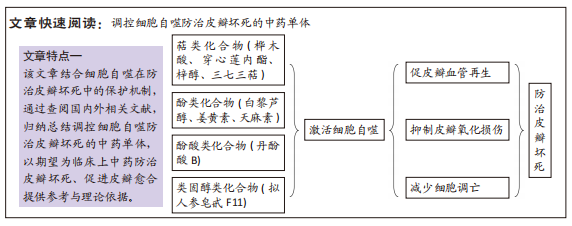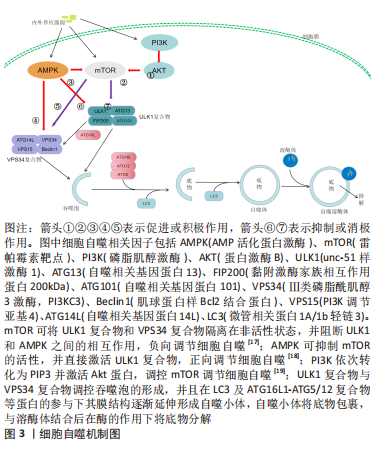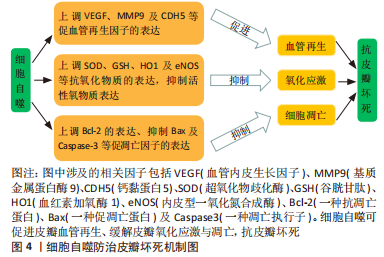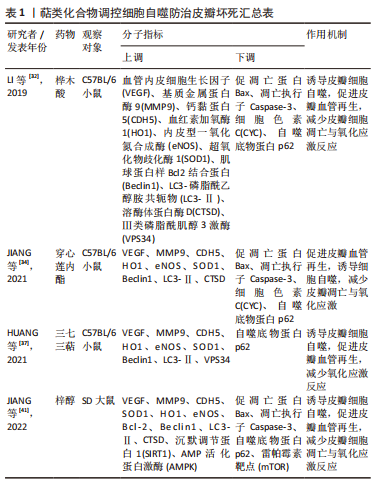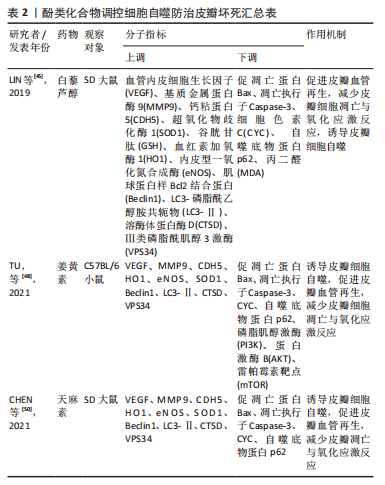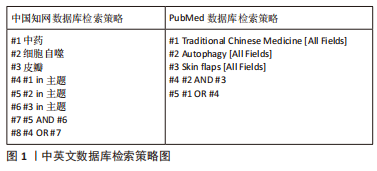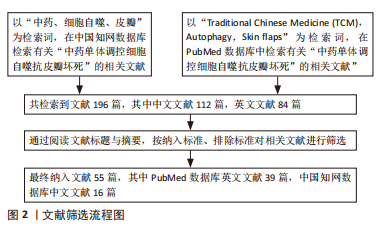[1] FUSE Y, YAMAMOTO T, KAGEYAMA T, et al. Domino free flap transfer using a superficial circumflex iliac artery perforator flap for the toe flap donor site. Ann Plast Surg. 2022;88(3):293-297.
[2] CHAMSEDDINE AH, DIB AA, WARDANI HM. The instep flap for anterior ankle coverage with bone and hardware exposure. Eur J Orthop Surg Traumatol. 2022;32(4):775-781.
[3] LEE MP, GIORDANO CN, HIGGINS HW 2ND, et al. Trends in interpolated flap repairs on the nose, eyelids, ears, and lips after skin cancer excision in the United States from 2007 to 2016. Dermatol Surg. 2021;47(2): 285-286.
[4] 何志军,刘涛,宋渊,等.消肿止痛合剂诱导缺氧内皮细胞再生效应观察及机制研究[J].中华中医药杂志,2020,35(6):3123-3127.
[5] 章盖,耿乐乐,方勇.缺血再灌注对小鼠胸部皮瓣的影响及机制研究[J].中华损伤与修复杂志(电子版),2019,14(6):416-425.
[6] 王海刚,何志军.皮瓣缺血再灌注损伤的相关机制研究进展[J].甘肃科技,2022,38(20):129-134.
[7] CASSIDY LD, NARITA M. Autophagy at the intersection of aging, senescence, and cancer. Mol Oncol. 2022;16(18):3259-3275.
[8] KLIONSKY DJ, PETRONI G, AMARAVADI RK, et al. Autophagy in major human diseases. EMBO J. 2021;40(19):e108863.
[9] ZHU X, HU X, LOU J, et al. Liraglutide, a TFEB-mediated autophagy agonist, promotes the viability of random-pattern skin flaps. Oxid Med Cell Longev. 2021;2021:6610603.
[10] ZACHARI M, GANLEY IG. The mammalian ULK1 complex and autophagy initiation. Essays Biochem. 2017;61(6):585-596.
[11] STORK B, DENGJEL J. Study of ULK1 catalytic activity and its regulation. Methods Enzymol. 2017;587:391-404.
[12] YANG G, SONG W, POSTOAK JL, et al. Autophagy-related protein PIK3C3/VPS34 controls T cell metabolism and function. Autophagy. 2021;17(5):1193-1204.
[13] NODA NN. Atg2 and Atg9: intermembrane and interleaflet lipid transporters driving autophagy. Biochim Biophys Acta Mol Cell Biol Lipids. 2021;1866(8):158956.
[14] BENTO CF, RENNA M, GHISLAT G, et al. Mammalian autophagy: how does it work? Annu Rev Biochem. 2016;85:685-713.
[15] TANIDA I. Autophagosome formation and molecular mechanism of autophagy. Antioxid Redox Signal. 2011;14(11):2201-2214.
[16] XU HD, QIN ZH. Beclin 1, Bcl-2 and autophagy. Adv Exp Med Biol. 2019; 1206:109-126.
[17] DELEYTO-SELDAS N, EFEYAN A. The mTOR-autophagy axis and the control of metabolism. Front Cell Dev Biol. 2021;9:655731.
[18] LI Y, CHEN Y. AMPK and Autophagy. Adv Exp Med Biol. 2019;1206:85-108.
[19] LARSEN LJ, MØLLER LB. Crosstalk of Hedgehog and mTORC1 Pathways. Cells. 2020;9(10):2316.
[20] NOWAK-SLIWINSKA P, ALITALO K, ALLEN E, et al. Consensus guidelines for the use and interpretation of angiogenesis assays. Angiogenesis. 2018; 21(3):425-532.
[21] WU H, DING J, LI S, et al. Metformin promotes the survival of random-pattern skin flaps by inducing autophagy via the AMPK-mTOR-TFEB signaling pathway. Int J Biol Sci. 2019;15(2):325-340.
[22] LOU J, ZHANG H, QI J, et al. Cyclic helix B peptide promotes random-pattern skin flap survival via TFE3-mediated enhancement of autophagy and reduction of ROS levels. Br J Pharmacol. 2022;179(2):301-321.
[23] 姚兴璋,刘涛,何志军,等.消肿止痛合剂对大鼠缺血皮瓣血管再生及VEGF-Dll4/Notch信号通路的影响[J].暨南大学学报(自然科学与医学版),2021,42(2):164-171.
[24] NISHIKAI-YAN SHEN T, KADO M, HAGIWARA H, et al. MMP9 secreted from mononuclear cell quality and quantity culture mediates STAT3 phosphorylation and fibroblast migration in wounds. Regen Ther. 2021; 18:464-471.
[25] RHO SS, ANDO K, FUKUHARA S. Dynamic regulation of vascular permeability by vascular endothelial cadherin-mediated endothelial cell-cell junctions. J Nippon Med Sch. 2017;84(4):148-159.
[26] 张畅. 脂肪来源干细胞及其条件培养基在防治血管内皮细胞氧化应激和皮瓣缺血再灌注中的研究[D].北京:北京协和医学院,2022.
[27] 高子浚,张皓,李春霖,等.氧化应激影响移植后皮瓣愈合的研究进展[J].国际骨科学杂志,2021,42(1):35-39.
[28] MAO X, CHENG R, ZHANG H, et al. Self-healing and injectable hydrogel for matching skin flap regeneration. Adv Sci (Weinh). 2018;6(3): 1801555.
[29] BALI U, AYDEMIR I, KEÇECI Y, et al. Effects of oxidative stress and apoptosis on vascularity and viability of perforator flaps. Biotech Histochem. 2021;96(7):526-535.
[30] AN T, ZHA W, ZI J. Biotechnological production of betulinic acid and derivatives and their applications. Appl Microbiol Biotechnol. 2020;104(8):3339-3348.
[31] XIE W, HU W, HUANG Z, et al. Betulinic acid accelerates diabetic wound healing by modulating hyperglycemia-induced oxidative stress, inflammation and glucose intolerance. Burns Trauma. 2022;10:tkac007.
[32] Li J, Bao G, ALyafeai E, et al. Betulinic acid enhances the viability of random-pattern skin flaps by activating autophagy. Front Pharmacol. 2019;10:1017.
[33] 秦慧真,林思,邓玲玉,等.穿心莲内酯药理作用及机制研究进展[J].中国实验方剂学杂志,2022,28(6):272-282.
[34] JIANG J, JIN J, LOU J, et al. Positive effect of andrographolide induced autophagy on random-pattern skin flaps survival. Front Pharmacol. 2021; 12:653035.
[35] XIE W, ZHU T, DONG X, et al. HMGB1-triggered inflammation inhibition of notoginseng leaf triterpenes against cerebral ischemia and reperfusion injury via MAPK and NF-κB signaling pathways. Biomolecules. 2019;9(10):512.
[36] SHI HB, CHEN JD, CHEN XH, et al. Effects of salvianolic acid and notoginseng triterpenes on angiogenesis in EA-hy926 cells in vitro. Chin J Nat Med. 2013;11(3):254-257.
[37] HUANG Z, LUO X, ZHANG Y, et al. Notoginseng triterpenes inhibited autophagy in random flaps via the Beclin-1/VPS34/LC3 signaling pathway to improve tissue survival. Front Bioeng Biotechnol. 2021; 9:771066.
[38] 董炤,陈长勋.梓醇药理作用的研究进展[J].中成药,2013,35(5):1047-1051.
[39] 周霞,张文倩,刘炬,等.从血管内皮生长因子及其受体调控角度探讨地黄梓醇促血管新生作用及分子机制研究[J].实用心脑肺血管病杂志,2020,28(2):64-68.
[40] 曹萍,程梦馨,沈丹,等.梓醇对衰老大鼠血管内皮细胞的保护作用研究[J].中西医结合心脑血管病杂志,2018,16(18):2630-2634.
[41] JIANG RH, DONG CJ, CHEN ZL, et al. Catalpol enhances random-pattern skin flap survival by activating sirt1-mediated enhancement of autophagy. Oxid Med Cell Longev. 2022;2022:5668226.
[42] 张琪,苏兰,何龙希,等.白藜芦醇的药理作用及其临床应用的研究进展[J].华西药学杂志,2022,37(2):214-217.
[43] BREUSS JM, ATANASOV AG, UHRIN P. Resveratrol and its effects on the vascular system. Int J Mol Sci. 2019;20(7):1523.
[44] HECKER A, SCHELLNEGGER M, HOFMANN E, et al. The impact of resveratrol on skin wound healing, scarring, and aging. Int Wound J. 2022;19(1):9-28.
[45] LIN J, LIN R, LI S, et al. Protective effects of resveratrol on random-pattern skin flap survival: an experimental study. Am J Transl Res. 2019;11(1):379-392.
[46] 陈美霓,郭巍,郝琴,等.姜黄素的药理作用、临床应用及机制研究进展[J].延安大学学报(医学科学版),2021,19(3):96-99.
[47] 周全,胡建中,黄莹,等.姜黄素对岛状皮瓣缺血再灌注损伤的影响[J].湖南中医药大学学报,2019,39(1):23-27.
[48] TU Z, JIANG X, LI Y, et al. Curcumin promotes the survival of ischemic random skin flaps via autophagy. Am J Transl Res. 2021;13(3):1337-1351.
[49] 胡国云,姜月华,赵海霞.天麻素的含量测定、结构表征和药理活性研究进展[J].当代化工,2022,51(1):169-173.
[50] CHEN H, CHEN B, LI B, et al. Gastrodin promotes the survival of random-pattern skin flaps via autophagy flux stimulation. Oxid Med Cell Longev. 2021;2021:6611668.
[51] 魏西羽,杨婷,刘厚汝,等.丹酚酸B的药理作用研究进展[J].药学研究,2021,40(11):748-752.
[52] 刘焕兴,季日旭,沈新升,等.丹酚酸B能促进大鼠腹部岛状皮瓣缺血再灌注损伤后的皮瓣成活[J].中华显微外科杂志,2019(6):557-561.
[53] LIN J, LIN R, LI S, et al. Salvianolic acid b promotes the survival of random-pattern skin flaps in rats by inducing autophagy. Front Pharmacol. 2018;9:1178.
[54] LIU YY, ZHANG TY, XUE X, et al. Pseudoginsenoside-F11 attenuates cerebral ischemic injury by alleviating autophagic/lysosomal defects. CNS Neurosci Ther. 2017;23(7):567-579.
[55] ZHOU F, ZHANG X, JIANG L, et al. Pseudoginsenoside F11 enhances the viability of random-pattern skin flaps by promoting TFEB nuclear translocation through AMPK-mTOR signal pathway. Front Pharmacol. 2021;12:667524. |
